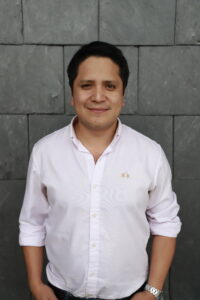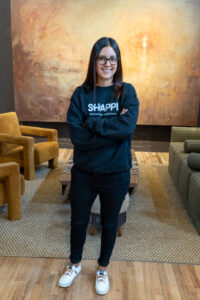Sybil Topel, MFA, IOM
Switching from a career in journalism to the corporate world makes sense; reporting is a difficult job. But to then switch back from said stable corporate job into journalism again sounds like a movie plot.
It's not. It's the life story of the new editor of Edge Magazine, Mary Fortune, read all about it.
Trend: You made a big career change by returning to the Chattanooga Times Free Press. I already know you’re passionate about great stories, but what made you decide to return?
Fortune: It’s true, I worked in corporate communications for a big company for the last 11-and-a-half years, but before that I was a newspaper reporter for 13 years. So my career change is more of a boomerang back to where I began.
I was always homesick for the newsroom, and my life has changed in ways that gave me the latitude — and the courage — to jump back in. Admittedly, it’s a strange time to bail out of the relative security of the corporate world and return to an industry that’s been hit as hard as news has in the last decade, but I love a good fight and I think I can be useful.
It also bears mentioning that the Chattanooga Times Free Press is owned by leadership that deeply believes in the power and importance of journalism. I don’t think most people understand how fortunate we are as a community to be in this position. The Chattanooga Times Free Press is privately held by a family that recently gave $25 million to the University of North Carolina at Chapel Hill’s journalism program. These folks are in it to do the right thing for our community, and I am proud to be part of their team.
Trend: What are you most curious about?
Fortune: People. The ways we navigate existence. Business is a fascinating topic because it’s all wrapped up in people’s dreams, their talents, their desires.
How do we spend our lives? Where do we invest our time and talents? What do we do when things don’t work out the way we planned? How do we work together to fix stuff? How do we mess stuff up in the first place? Those are business questions, and they are human questions, and they are all the same.
Trend: What should people in Chattanooga know about pitching a story?
Fortune: Bring it. I love to get pitched, and I am always on the hunt for great stories. I’m particularly interested in surfacing voices that might not normally get heard. There are so many great things happening just below the surface of the everyday stuff. I’m at [email protected] and I am always down to hear ideas.
But dude, do not tell me you can’t access the article I wrote about your business because you don’t have a subscription to the paper. I will not send you a screenshot. I will not. Subscribe. If you want to read the work we spend our days (and nights) churning out, help us keep the lights on in this place.
Trend: What do you look forward to most in your new role?
Fortune: Writing all the live-long day. I had a good gig in the corporate world, but I ended up in a spot where I wasn’t really a writer anymore. Now I wake up every morning, and all I do is report stories — which is also a blast — and write them up. If you asked me to describe heaven, that is pretty much how I’d frame it up.
Trend: What has changed about the newsroom? What changes would you like to see Chattanooga and Hamilton County make?
Fortune: Well, my newsroom home isn’t nearly as full of people as it once was, and we all know the landscape has gotten tough in many ways for newspapers. But the things that haven’t changed abound. I am surrounded all day, every day by people who work crazy hours to cover our community, to find and tell the stories that matter to our readers.
No one has ever gotten into this business for the money or the public adulation, but I have particular respect for the young people I’m working with now. They chose a field that’s under siege in a way it absolutely wasn’t when I was cutting my teeth in the 1990s. They are scrappers.
I’m not in the business of telling the city or county what to do — in my role, I’ve got to keep my opinions out of the way — but I have been here for 30 years, and I have seen a lot of change. I remember when many people thought that fish tank (Tennessee Aquarium) was a crazy idea.
When I bought a house in North Chattanooga in 1996, my dad wanted to get me a gun as a housewarming gift. So a lot of the change I’ve seen is good, but I’ll also say this: The more people who can benefit from and access the fruits of that change, the stronger we will be as a community.
Investing in people is the most important work we can collectively do.
Trend: What’s the most difficult news you’ve written about?
Fortune: I was a crime reporter in my first journalism life. I saw and heard and wrote about things then that I still think about now. The children who found a gun in their yard in North Brainerd. The young mother in Alton Park who was trying to raise her twins and go to school and pay the bills and, ultimately, just could not make it all work.
I think being a journalist is good training in being human, and I would not trade a minute of it. But I do wish there wasn’t quite so much to cover when it comes to people’s suffering.
Trend: What assignment was most fun?
Fortune: I’ve had a lot of fun in this job over the years, but one of the best assignments came when I was 30 years old and Mark Kennedy, then the Lifestyle Editor for the newspaper, asked me to write a personal column about life in my 30s. I wrote that thing for so long that it turned into a column about life in my 40s.
I heard from so many wonderful people as a result of that column — they shared their stories with me because I had shared my story with them, and that’s a great gift for a writer, to know your words moved someone.
Trend: You are also pursuing a masters degree. Tell us more.
Fortune: It’s true, I’m chasing a masters in creative writing at the University of Tennessee at Chattanooga. I love being in the classroom — I taught as an adjunct professor in the communication department there for years. I’m going mighty slow, one class at a time, so I’ll be an old woman leaning on a stick by the time I wrap this up, but it’s a lot of fun. It’s also humbling, and that’s good for me. I’ve been a writer for 25 years, but I don’t know a thing in the world about a whole lot of stuff, and the professors in that program are blowing the doors off my brain in a big way. It hurts sometimes, but it’s all good.
Trend: What do you do for fun?
Fortune: When I have down time, I love to practice yoga, escape to the woods with a stack of books and drink good wine. I guess a perfect day would involve all three.






